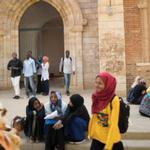Forcibly Displaced Sudanese Women Navigating Loss, Reconstructing Identity, and Reconfiguring Gender Relations
The outbreak of war in Sudan in April 2023 forced millions to flee their homes, carrying only limited valuables and currency in their haste to escape. Many have since settled in Egypt. Prolonged displacement has compelled many, particularly middle- and upper-class women, to navigate profound material loss while reconstructing their class-based identities and livelihoods in Cairo.
This paper examines how displaced Sudanese women have transformed their remaining social and cultural capital into entrepreneurial endeavors. Based on interviews and observations, it highlights how these women mobilize networks, reputations, and gendered resources to create businesses that meet the needs of a middle- and upper-middle class clientele. From home-based production of food, perfumes, and clothing to participation in bazaars and the establishment of brick-and-mortar shops and restaurants, their efforts generate income while reconstructing and reshaping their social roles.
Far from merely economic ventures, these activities serve as coping mechanisms for the trauma of war and displacement and platforms for reconstituting classed identities. The women’s entrepreneurial strategies also challenge entrenched gender norms, enabling them to negotiate greater spatial mobility and autonomy in Cairo than they had in Sudan.
This paper argues that such efforts represent a critical intersection of capital, politics, and identity, where displaced Sudanese women play an agentive role in sustaining families and fostering community ties in exile. By centering the experiences of forcibly displaced individuals, it shifts the focus from state-centric narratives to the resourcefulness and resilience of the Sudanese community in navigating the challenges of prolonged displacement.
The paper was presented as part of a SNAC organized panel on Sudanese displacement: capital, identity and agency organized by Munzoul Assal and Mari Norbakk






